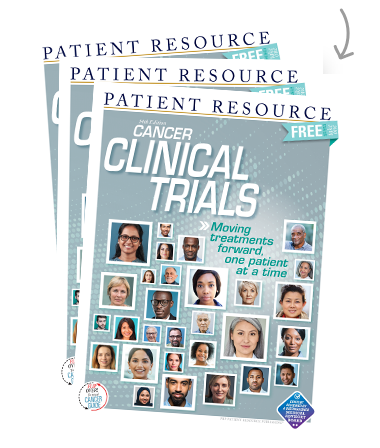Clinical Trials
Glossary: Terms to Know
As you consider a clinical trial, you will hear many new words. These definitions may help.
Case manager: A personal advocate who collaborates with health care professionals and nonmedical personnel to help patients overcome various financial, logistical and other common barriers to care.
Claim: A request for payment you make to your insurance provider based on the terms of your policy.
Copay: The fixed amount, according to your insurance plan, that you must pay for specific types of medical care, usually at the time of service.
Deductible: The amount that you must pay for medical expenses before your insurance begins paying.
Eligibility criteria: The guidelines defining who can participate in the clinical trial based on several factors, which may include age, type and stage of cancer and treatment history.
Explanation of benefits (EOB): A statement your health insurance company provides to explain which medical treatments and/or services were paid on your behalf.
Financial counselor: A person who works with patients and their families to reduce stress or hardships related to treatment costs. This may include setting up payment plans, finding cost-saving methods and improving access to services.
HIPAA: The Health Insurance Portability and Accountability Act is a law that protects the privacy of your personal medical information.
Informed Consent form: A document that contains information about the clinical trial, including the potential benefits, risks and the alternatives to the research being conducted. You are required to review the document and sign the form to enroll in the trial.
Medicaid: A health insurance program for people who cannot afford regular medical insurance. The program is run by U.S. federal, state and local governments. People who receive Medicaid may have to pay a small amount for the services they get.
Medicare: A U.S. federal health insurance program for people aged 65 years or older and people with certain disabilities. Medicare pays for hospital stays, medical services and some prescription drugs. People who receive Medicare must pay part of their healthcare costs.
Out-of-network: The term given to health care providers or facilities not associated with your insurance plan. Their fees are typically more than in-network fees.
Out-of-pocket costs: Medical expenses you are responsible for paying. This may include deductibles, coinsurances and copayments for covered services, plus all costs for services not covered by your insurance plan or other entities.
Precertification: The process of getting approved by your insurance company for specific services, procedures or treatments before you have them.
Some definitions courtesy of the National Cancer Institute website (www.cancer.gov)



